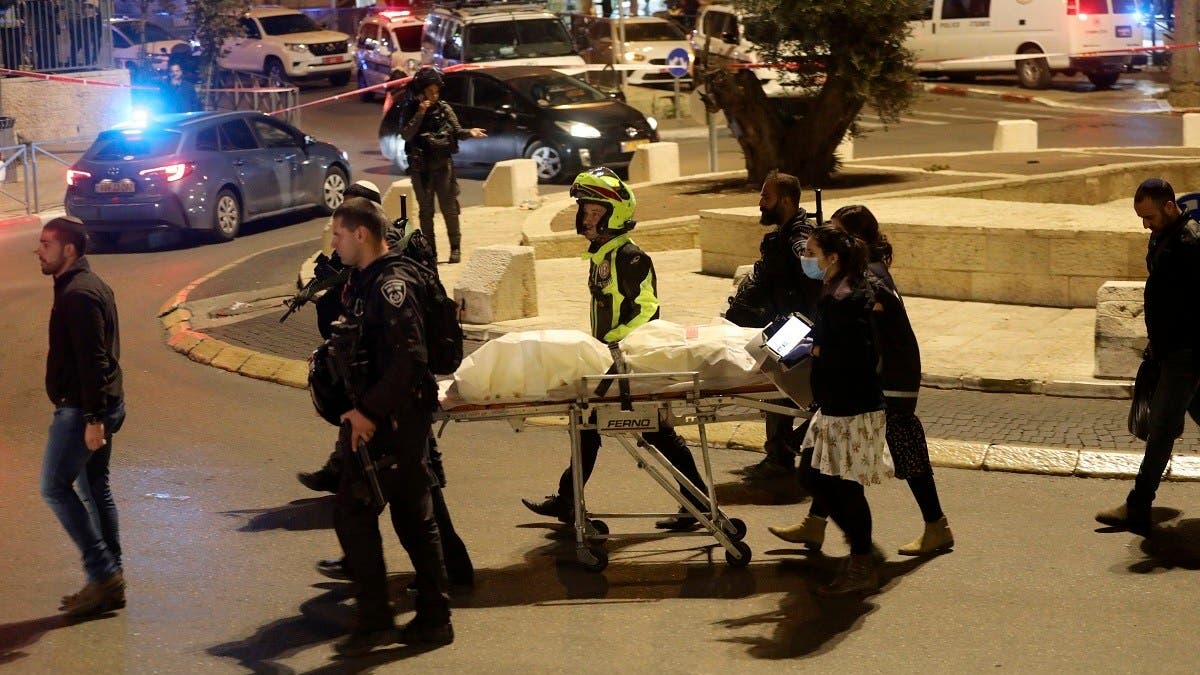Israel’s Justice Ministry said on Sunday that two police officers were brought in for questioning following the shooting death of a Palestinian who had stabbed an Israeli man in east Jerusalem.
Israeli police released surveillance video in which the attacker can be seen Saturday stabbing the ultra-Orthodox Jewish man and then trying to stab a Border Police officer before being shot and falling to the ground. Police identified the attacker as a 25-year-old from Salfit, in the occupied West Bank. Police could later be seen carrying the body away on a stretcher.
For the latest headlines, follow our Google News channel online or via the app.
A widely circulated video shot by a bystander appeared to show an officer from Israel’s paramilitary Border Police shooting the attacker when he was already lying on the ground, and another appeared to show police with guns drawn preventing medics from reaching him, prompting calls for an investigation into possible excessive use of force.
The shooting drew comparisons to a 2016 incident in which an Israeli soldier was caught on camera shooting a wounded Palestinian attacker who was lying on the ground.
The Justice Ministry’s police investigations unit said the police officers were questioned shortly after the incident and released without conditions.
Israeli Prime Minister Naftali Bennett released a statement in support of the officers. Other leaders also defended their actions.
“It’s not clear if the terrorist maybe has an explosive belt. All sorts of things could happen,” Public Security Minister Omer Barlev, who oversees the police, told Israeli Army Radio Sunday. “They acted correctly.”
The incident happened near Damascus Gate just outside Jerusalem’s Old City, a tense and crowded area that is often the scene of demonstrations and clashes.
The Old City is in east Jerusalem, which Israel captured in the 1967 war along with the West Bank and Gaza. Israel annexed east Jerusalem in a move not recognized internationally and considers the entire city its capital.
The Palestinians want east Jerusalem to be the capital of their future state, to include the West Bank and Gaza.
There have been dozens of attacks in recent years in and around the Old City, nearly all carried out by individual Palestinians with no known links to armed groups.
Palestinians and Israeli rights groups say security forces sometimes use excessive force in response to attacks, killing suspected assailants who could have been arrested or who posed no immediate threat to security forces.
Rights groups also say Israel rarely holds members of its security forces accountable for the deadly shootings of Palestinians. Investigations often end with no charges or lenient sentences, and in many cases witnesses are not summoned for questioning.
Israel says its security forces make every effort to avoid harming civilians and that it investigates alleged abuses.
In the widely publicized 2016 case, Israeli soldier Elor Azaria was caught on camera shooting a wounded Palestinian attacker who was lying on the ground. Azaria later served two-thirds of a 14-month sentence after being convicted of reckless manslaughter.
His case sharply divided Israelis. The military pushed for his prosecution, saying he violated its code of ethics, while many Israelis, particularly on the nationalist right, defended his actions.
In a more recent case, a Border Police officer was charged with reckless manslaughter in the deadly shooting of an autistic Palestinian man in Jerusalem’s Old City last year.
The indictment came just over a year after the shooting of Eyad Hallaq, whose family has criticized Israel’s investigation into the killing and called for much tougher charges. The shooting has drawn comparisons to the police killing of George Floyd in the United States.
Read more: Gunman kills one in Jerusalem’s Old City, shot dead by Israeli police

 World3 years ago
World3 years ago
 World2 years ago
World2 years ago
 Entertainment7 years ago
Entertainment7 years ago
 World7 years ago
World7 years ago
 Entertainment7 years ago
Entertainment7 years ago






